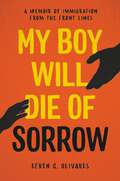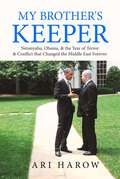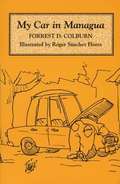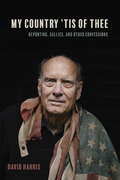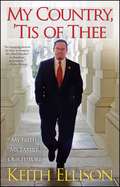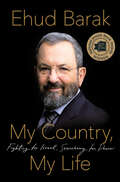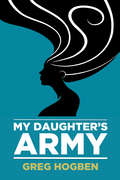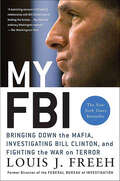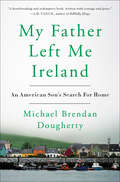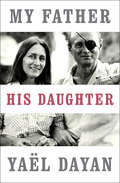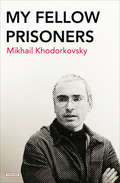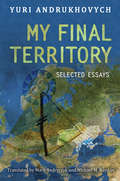- Table View
- List View
My Boy Will Die of Sorrow: A Memoir of Immigration From the Front Lines
by Efrén C. OlivaresINTERNATIONAL LATINO BOOK AWARD WINNER - The Raul Yzaguirre Best Political/Current Affairs Book This deeply personal perspective from a human rights lawyer—whose work on the front lines of the fight against family separations in South Texas intertwines with his own story of immigrating to the United States at thirteen—reframes the United States' history as a nation of immigrants but also a nation against immigrants. In the summer of 2018, Efrén C. Olivares found himself representing hundreds of immigrant families when Zero Tolerance separated thousands of children from their parents at the U.S.-Mexico border. Twenty-five years earlier, he had been separated from his own father for several years when he migrated to the U.S. to work. Their family was eventually reunited in Texas, where Efrén and his brother went to high school and learned a new language and culture. By sharing these gripping family separation stories alongside his own, Olivares gives voice to immigrants who have been punished and silenced for seeking safety and opportunity. Through him we meet Mario and his daughter Oralia, Viviana and her son Sandro, Patricia and her son Alessandro, and many others. We see how the principles that ostensibly bind the U.S. together fall apart at its borders.My Boy Will Die of Sorrow reflects on the immigrant experience then and now, on what separations do to families, and how the act of separation itself adds another layer to the immigrant identity. Our concern for fellow human beings who live at the margins of our society—at the border, literally and figuratively—is shaped by how we view ourselves in relation both to our fellow citizens and to immigrants. He discusses not only law and immigration policy in accessible terms, but also makes the case for how this hostility is nothing new: children were put in cages when coming through Ellis Island, and Japanese Americans were forcibly separated from their families and interned during WWII. By examining his personal story and the stories of the families he represents side by side, Olivares meaningfully engages readers with their assumptions about what nationhood means in America and challenges us to question our own empathy and compassion.
My Brother's Keeper: Netanyahu, Obama, & the Year of Terror & Conflict that Changed the Middle East Forever
by Ari Harow&“A useful aid to understanding today&’s headlines as well as Israel&’s recent past.&” –Kirkus Review My Brother&’s Keeper tells the behind-the-scenes story of how the American President and the Israeli Prime Minister clashed about peace, war, and the future of the region.Barack Obama and Benjamin Netanyahu viewed the world—and especially the Middle East—differently. The US president wanted to end what he saw as America&’s perpetual war against the Muslim and Arab worlds, use diplomacy to bring about a Palestinian state coexisting peacefully with Israel, and apply his signature foreign policy vision to reward the Islamic Republic of Iran in exchange for the scaling back of their nuclear pursuits. The Israeli premier wanted his country to thrive without the senseless bloodshed of terror and violence, and he was determined to protect the Jewish state from threats of annihilation by a member of the axis of evil that would one day be armed with nuclear weapons. Netanyahu wanted peace for peace, as well as the acceptance of Israel as a full-fledged part of the Middle East. In 2014, during a pivotal summer of terrorist violence, a war in Gaza, and the advancement of a nuclear deal with Iran, the two men clashed, threatening the US-Israeli strategic alliance and the future of the region. The Middle East would never be the same.
My Car in Managua
by Forrest D. ColburnHistories of revolutions often focus on military, political, or economic upheavals but sometimes neglect to connect these larger events to the daily lives of "ordinary" people. Yet the peoples' perception that "things are worse than before" can topple revolutionary governments, as shown by the recent defeat of the Sandinista regime in Nicaragua and the governments of Eastern Europe. Providing the kind of prosaic, revealing details that more formal histories have excluded, My Car in Managua offers an objective, often humorous description of the great difficulties and occasional pleasures of life in Nicaragua during the Sandinista revolution. During a year's work (1985-1986) at the Instituto Centroamericano de Administración de Empresas (INCAE), Forrest Colburn purchased a dilapidated car-and with it an introduction to everyday life in Nicaragua. His discoveries of the length of time required to register the car (approximately six weeks), the impossibility of finding spare parts (except when U. S. dollars were applied to the search), and the fact that "anyone getting into a car in Managua can be charged a small fee [for car watching] by anyone else" all suggest the difficulties most Nicaraguans faced living in a devastated economy. Drawing on experiences from visits throughout the revolutionary period (1979-1989), Colburn also sheds light on how the Revolution affected social customs and language, gender roles and family relationships, equality and authority, the availability of goods and services, the status of ethnic minorities, and governmental and other institutions. Illustrations by Nicaragua's celebrated political cartoonist Róger Sánchez Flores enliven the lucid text.
My Country 'Tis of Thee: Reporting, Sallies, and Other Confessions
by David HarrisDavid Harris is a reporter, a clear-eyed idealist, an American dissident, and, as these selected pieces reveal, a writer of great character and empathy. Harris gained national recognition as an undergraduate for his opposition to the Vietnam War and was imprisoned for two years when he refused to comply with the draft. His writings trace a bright throughline of care for and attention to outsiders, the downtrodden, and those who demand change, and these eighteen pieces of long-form journalism, essays, and opinion writings remain startlingly relevant to the world we face today. This career-spanning collection of writings by an always-independent journalist follow Harris from his early days as a prominent leader of the resistance to the Vietnam War, through regular contributions to many publications, including Rolling Stone and the New York Times, and on into the twenty-first century.Born in Fresno and elected student body president of Stanford University in 1966, Harris has always had an undeniably Californian point of view—he imagines the future with an open heart and mind and pursues stories out of genuine curiosity, embedding himself among striking farmworkers, marijuana growers, the homeless on LA’s skid row, and occasionally, redwood trees. Inspiring, clarifying, and fearless, his abiding and lucid patriotism insists that our country live up to its own ideals.
My Country 'Tis of Thee: Reporting, Sallies, and Other Confessions
by David HarrisA “wide-ranging and incisive anthology” of articles and essays by the eminent journalist and antiwar activist from the 1960s to the twenty-first century (Publishers Weekly).David Harris is a reporter, an American dissident, and, as these selected pieces reveal, a writer of great character and empathy. As an undergraduate, he gained recognition for his opposition to the Vietnam War and was imprisoned for two years when he refused to comply with the draft. Throughout his long career, his writing has championed outsiders, the downtrodden, and those who demand change. These eighteen pieces of long-form journalism, essays, and opinion writings remain startlingly relevant to the world we face today. This career-spanning collection follows Harris from his early days as a prominent leader of the resistance to the Vietnam War, through regular contributions to many publications, including Rolling Stone and the New York Times.Born in Fresno and elected student body president of Stanford University in 1966, Harris has always had an undeniably Californian point of view—he imagines the future with an open heart and mind and pursues stories out of genuine curiosity, embedding himself among striking farmworkers, marijuana growers, the homeless on LA’s skid row, and occasionally, redwood trees. Inspiring, clarifying, and fearless, his abiding and lucid patriotism insists that our country live up to its own ideals.
My Country, 'Tis of Thee: My Faith, My Family, Our Future
by Keith EllisonAs the first Muslim elected to Congress, Minnesota Democrat Keith Ellison explores what it's like to be an American in the twenty-first century.As a Black, Latino, and former Catholic who converted to Islam, Keith Ellison, is the first Muslim elected to Congress—from a district with fewer than 1 percent Muslims and 11 percent Blacks. With his unique perspective on uniting a disparate community and speaking to a common goal, Ellison takes a provocative look at America and what needs to change to accommodate different races and beliefs. Filled with anecdotes, statistics, and social commentary, Ellison touches on everything from the Tea Party to Obama, from race to the immigration debate and more. He also draws some very clear distinctions between parties and shows why the deep polarization is unhealthy for America. Deeply patriotic, with My Country &’Tis of Thee, Ellison strives to help define what it means to be an American today.
My Country, My Life: Fighting for Israel, Searching for Peace
by Ehud BarakWINNER OF THE 2018 NATIONAL JEWISH BOOK AWARDThe definitive memoir of one of Israel's most influential soldier-statesmen and one-time Prime Minister, Ehud Barak, with insights into forging peace in the Middle East.In the summer of 2000, the most decorated soldier in Israel's history—Ehud Barak—set himself a challenge as daunting as any he had faced on the battlefield: to secure a final peace with the Palestinians. He would propose two states for two peoples, with a shared capital in Jerusalem. He knew the risks of failure. But he also knew the risks of not trying: letting slip perhaps the last chance for a generation to secure genuine peace.It was a moment of truth.It was one of many in a life intertwined, from the start, with that of Israel. Born on a kibbutz, Barak became commander of Israel's elite special forces, then army Chief of Staff, and ultimately, Prime Minister.My Country, My Life tells the unvarnished story of his—and his country's—first seven decades; of its major successes, but also its setbacks and misjudgments. He offers candid assessments of his fellow Israeli politicians, of the American administrations with which he worked, and of himself. Drawing on his experiences as a military and political leader, he sounds a powerful warning: Israel is at a crossroads, threatened by events beyond its borders and by divisions within. The two-state solution is more urgent than ever, not just for the Palestinians, but for the existential interests of Israel itself. Only by rediscovering the twin pillars on which it was built—military strength and moral purpose—can Israel thrive.
My Darling Winston: The Letters Between Winston Churchill And His Mother
by David Lough Randolph ChurchillA significant addition to the Churchill canon, My Darling Winston traces Churchill’s emotional, intellectual, and political development over a forty-year period as confided to his mother. My Darling Winston is an edited collection of the personal letters between Winston Churchill and his mother, Jenny Jerome, between 1881—when Churchill was just six—and 1921, the year of Jenny’s death. Many of these intimate letters— between two gifted writers—are published here for the first time, and the exchange of letters between mother and son has never before been published as a correspondence. A significant addition to the Churchill canon, My Darling Winston traces Churchill’s emotional, intellectual, and political development as confided to his primary mentor, his mother. As well as providing a basic narrative of Jenny’s and Winston Churchill’s lives over a forty-year period, My Darling Winston tells the story of a changing mother-son relationship, characterized at the outset by Churchill’s emotional and practical dependence on his mother, but which is dramatically reversed as her life begins to disintegrate tragically towards its end.
My Daughter's Army
by Greg HogbenHas a gay man been chosen to raise the Daughter of God? Or is Adam Goodwin's adopted daughter plagued by a benevolent delusion that threatens to undermine her global campaign for women's rights? From the moment Adam Goodwin discovered baby Sera abandoned in Grand Central Station, they shared an unexplainable bond. Sera grows into a compassionate and charismatic young woman, despite Adam's worries that she may have difficulty distinguishing fantasy from reality. Does her hypersensitivity to the suffering of others show compassion--or troubling obsession? Adam channels Sera's growing fixation on gender inequality into uniting her army of social media followers to battle the worldwide oppression of women. But the encouragement he hoped would alleviate the symptoms of a possible mental illness only appear to make matters worse. The stress and success of her crusade seem to have brought on a mental break when she confides that she believes she is the female Messiah, sent to redress the injustices women face. With enemies of her cause multiplying, Adam must protect Sera from the threats they pose--and from the threat she may pose to herself.
My Dear President: Letters Between Presidents and Their Wives
by Gerard W. Gawalt"I am very madly in love with you," wrote Lyndon Johnson to his future wife, Bird Taylor. James Madison sent off this plaintive line to his wife Dolley: "Every thing around and within reminds me that you are absent. " In this inspiring collection of correspondence between U. S. presidents and their wives are hundreds of unguarded moments of affection, strain, grief, and triumph, revealing as never before the private thoughts and working partnerships of our most public figures. Culled from the holdings of the Library of Congress and various presidential libraries and private collections, it is the most comprehensive compilation of its kind ever put together. More than half of the letters included here have never before been published, making this a historic as well as a heartfelt volume that casts a warm, new light on our leaders at their most open-hearted and vulnerable. Gerard Gawalt, a curator of presidential papers at the Library of Congress for the past thirty years, has divided the book thematically into such topics as love, war, politics, travel, and sorrow. Each letter appears in its entirety, with the original spelling and grammar intact, and is set in historic context for a full sense of the moment that formed its backdrop. In most cases, exchanges are included, forming an enlightening dialogue between husband and wife. Throughout, historic photographs and artwork from the Library of Congress's collection enhance the text. Like its companion volume, "First Daughters, My Dear President" is bound to become a cherished gift for all those interested in American history for years to come.
My Dearest Friend: Letters of Abigail and John Adams
by Abigail AdamsSpanning nearly forty years, the letters collected in this volume form the most significant correspondence—and reveal one of the most intriguing and inspiring partnerships—in American history.
My Dearest Friend: Letters of Abigail and John Adams
by Margaret A. Hogan C. James Taylor(from Forward: J. Ellis)My two favorite Sceanes of John and Abigail Adams come from their retirement years at Quincy. In the first John is out in the fields working alongside his hired hands, swinging the scythe as he murmurs curses under his breath against Tom Paine and Alexander Hamilton. Abigail is duly recording his murmurings, seconding his denunciations, noting that Thomas Jefferson should also be added to the rogues' gallery. In the second scene, Abigail has descended to the basement of the Quincy house to shell peas. John accompanies her, bringing along a copy of Descartes to read to her while she prepares dinner. It is the combination of pungency and intimacy embodied in these two Sceanes that gives the correspondence between John and Abigail such enduring significance, though a few other factors contribute to the ultimate impact. They happened to be living through the most tumultuous and consequential chapter in America's birth as a nation, when the core values were declared and the abiding institutions created. They happened to be centrally involved in these declarations and creations. They happened to preserve about 1,160 letters between them, recording their thoughts and feelings with uncommon candor. (Martha Washington destroyed all but three of the letters she and George exchanged.) And both of them happened to be, each in their own distinctive ways, prose stylists of equally uncommon felicity. If you want to understand how the American republic was improvised on the run, this is a seminal source. If you want to understand how a husband and wife can sustain their love over a lifetime of struggle and
My Dearest Wife: The Private and Public Lives of James David Edgar and Matilda Ridout Edgar
by Maud J. Mclean Robert M. StampThe private and public lives of James David Edgar and Matilda Ridout Edgar symbolized the increasingly complex nature of Toronto society as older generations gradually gave way to a new generation of "outsiders" seeking fame and prominence.James David Edgar (1841-1899), a self-made man, born to proud though impoverished Scottish-immigrant parents in Quebec, became a lawyer, an author, a railway promoter, an M.P. and ultimately speaker of the House of Commons in Ottawa. Matilda Ridout Edgar (1845-1910) was one of Canada’s first widely respected female historians and ultimately president of the National Council of Women of Canada from 1906 until her death.This dual biography, revealed through the voices of James and Matilda, as expressed through correspondence, provides insights into 19th-century Canadian history, and presents a mutually supportive marital relationship, each encouraging professional fulfillment for the other – a stance surprising in this era of male dominance.
My Declaration Of Independence
by James M. JeffordsSenator James Jeffords of Vermont left the Republican Party on May 24, 2001, when he could no longer reconcile his beliefs with the policies of the party he had supported his whole Ault life."Looking ahead," Jeffords said, "I can see more and more instances where I will disagree with the President on very fundamental issues." In My Declaration of Independence, Jeffords explains the issues that led to this dramatic break. Foremost among them was the Bush administration's and the Republican leadership's failure to recognize the need to invest in education, now and in the future. Tracing the genesis of his decision, Jeffords describes his attempts to effect change within its party, and the pain of hurting Republican colleagues and friends. His decision came just at he moment when his defection would deprive them of the Washington trifects they had recently achieved-Republican control of the White House, the Senate, and the House of representatives. It was also going to cost many of his friends committee chairmanships they had acquired only a few months before. "But in he end," he writes, "I had to be true to what I hought was right, and leave the consequences to sort themselves out in the days ahead." In a contemporary Profiles in Courage, Senator Jeffords provides a moving, witty, and instructive example of what can happen in public life. Whether you agree with his views or not, his account of his tough decisions, and of his anguish at rejecting the last-minute appeals of the leadership of his party, the President, and his wife, is a riveting story that has wide implications for the whole country.
My Early Years
by Fidel CastroExcerpting conversations between Cuban President Fidel Castro and Brazilian priest Frei Bretto, this work contains Castro's own account of his childhood and youth. It also contains a 1995 speech by Castro at the U. of Havana in which he reflects on his days as student organizer and Colombian journalist Arturo Alape about the April 1948 popular uprising in Colombia, which Castro witnessed. New to this edition are excerpts from Castro's prison letters shortly after the failed attack on the Moncada barracks in 1953. Annotation ©2006 Book News, Inc., Portland, OR (booknews.com)
My FBI: Bringing Down the Mafia, Investigating Bill Clinton, and Fighting the War on Terror
by Louis J. FreehFrom his Catholic upbringing, through his jobs as a US attorney and a Federal judge, Freeh was the most hands-on director in FBI history.
My FBI: Bringing Down the Mafia, Investigating Bill Clinton, and Fighting the War on Terror
by Louis J. FreehA spectacular New York Times and Washington Post bestseller, My FBI is the definitive account of American law enforcement during the Clinton years and in the run-up to September 11. Louis Freeh is clear eyed, frank, the ultimate realist, and he offers resolute vision for the struggles ahead.Bill Clinton called Freeh a "law enforcement legend" when he nominated him as the Federal Bureau of Investigation Director. The good feelings would not last. Going toe-to-toe with his boss during the scandal-plagued ‘90s, Freeh fought hard to defend his agency from political interference and to protect America from the growing threat of international terrorism. When Clinton later called that appointment the worst one he had made as president, Freeh considered it "a badge of honor." This is Freeh's entire story, from his Catholic upbringing in New Jersey to law school, the FBI training academy, his career as a US District attorney and as a federal judge, and finally his eight years as the nation's top cop. This is the definitive account of American law enforcement in the run-up to September 11. Freeh is clear-eyed, frank, the ultimate realist, and he offers resolute vision for the struggles ahead."[Freeh] comes off as the real deal, an honorable, hard-working man, a devoted public servant and father, a gifted lawyer and onetime federal prosecutor."---The New York Times
My Father Left Me Ireland: An American Son's Search For Home
by Michael Brendan DoughertyNational Review senior writer Michael Brendan Dougherty delivers a meditation on belonging, fatherhood, and nationalism, through a series of letters to his estranged Irish father.The child of an Irish man and an Irish-American woman who split up before he was born, Michael Brendan Dougherty grew up with an acute sense of absence. He was raised in New Jersey by his hard-working single mother, who gave him a passion for Ireland, the land of her roots and the home of Michael's father. She put him to bed using little phrases in the Irish language, sang traditional songs, and filled their home with a romantic vision of a homeland over the horizon. Every few years, his father returned from Dublin for a visit, but those encounters were never long enough. Devastated by his father's departures, Michael eventually consoled himself by believing that fatherhood was best understood as a check in the mail. Wearied by the Irish kitsch of the 1990s, he began to reject his mother's Irish nationalism as a romantic myth.Years later, when Michael found out that he would soon be a father himself, he could no longer afford to be jaded; he would need to tell his daughter who she is and where she comes from. He immediately re-immersed himself in the biographies of firebrands like Patrick Pearse and studied the Irish language. And he decided to reconnect with the man who had left him behind, and the nation just over the horizon. He began writing letters to his father about what he remembered, missed, and longed for. Those letters would become this book.Along the way, Michael realized that his longings were shared by many Americans of every ethnicity and background. So many of us these days lack a clear sense of our cultural origins or even a vocabulary for expressing this lack--so we avoid talking about our roots altogether. As a result, the traditional sense of pride has started to feel foreign and dangerous; we've become great consumers of cultural kitsch, but useless conservators of our true history. In these deeply felt and fascinating letters, Dougherty goes beyond his family's story to share a fascinating meditation on the meaning of identity in America.
My Father at 100
by Ron ReaganFebruary 6, 2011, is the one hundredth anniversary of Ronald Reagan's birth. To mark the occasion, Ron Reagan has written My Father at 100, an intimate look at the life of his father-one of the most popular presidents in American history-told from the perspective of someone who knew Ronald Reagan better than any advisor, friend, or colleague. As he grew up under his father's watchful gaze, he observed the very qualities that made the future president a powerful leader. Yet for all of their shared experiences of horseback rides and touch football games, there was much that Ron never knew about his father's past, and in My Father at 100 he sets out to understand this beloved, if often enigmatic figure who turned his early tribulations into a stunning political career. Since his death in 2004, President Reagan has been a galvanizing force that personifies the values of an older America and represents an important era in national history. Ron Reagan traces the sources of these values in his father's early years and offers a heartfelt portrait of a man and his country-and his personal memories of the president he knew as "Dad. "
My Father's House: An Ode to America's Longest-Serving Black Congressman
by John Conyers IIIIn this moving work, part clear-eyed assessment, part memoir, the son of iconic African American Congressman John Conyers Jr. shines a spotlight on his father and his political legacy, and reveals how, as his son, he eventually learned to leverage his own voice in a world that his father helped create.A respectful, thoughtful, yet clear-eyed reframing of a national hero’s personal and political odyssey, My Father’s House is John Conyers III's love letter to his father and a record of his own journey. Conyers reveals a towering figure in modern American political history and an ordinary family man; a leader whose work in Washington necessitated his many absences as a father from a son coming of age in Detroit.John Conyers III introduces us to John James Conyers, Jr. the legislator, who changed lives and made history, and of his equity-focused work that remains to be done. We meet Conyers the politician and mentor who worked with and counselled a network of powerbrokers—often from the family home on Seven Mile Road in the Motor City—including President Bill Clinton, Congressmen Adam Clayton Powell Jr., Charlie Rangel, Martin Luther King Jr., Rosa Parks, the Reverend Jesse Jackson, feminist Gloria Steinem, entertainer-activists Harry Belafonte, Berry Gordy, Stevie Wonder, Ossie Davis, Ruby Dee, Chris Tucker and a slew of other players in Washington, DC, and across the nation.A resonant political, historical, and family story, My Father’s House explores how John James Conyers, Jr., was at once a man of deep and abiding spiritual faith, human talents, and human weaknesses. As he places his father among this land's greatest lawmakers, he also demystifies and grounds the Civil Rights giants of that era, reminding us of their noble yet deeply flawed humanity. This exploration of John James Conyers, Jr., told through John Conyers III's eyes and experiences, is essential to a thorough understanding of modern U.S. politics and the cultures and human lives it continues to shape.My Father’s House includes a black-and-white photo insert.
My Father, His Daughter
by Yaël DayanA life of one of Israel's greatest heroes, as seen through his daughter's eyes Moshe Dayan was one of the greatest military leaders in Israel's short history. A child of the first kibbutz movement in British Palestine, he went on to lead Israel to victory in the 1948 War of Independence and to liberate Jerusalem in the 1967 Six-Day War. Dayan was not only a soldier but a politician, an archaeologist, and a larger-than-life figure who helped shape the state of Israel. In My Father, His Daughter, Yaël Dayan, who herself served in the Israeli Parliament, shares an uncensored look into her father's life and her own conflicted relationship with him. With poignancy and candor, Dayan creates a profound yet nuanced profile of her father. She relates his strong national pride, his boldness in dealing with other world leaders, and his troubles at home to his disintegrating marriage and multiple affairs. As revealing as My Father, His Daughter is of the man behind the myth, it is also a snapshot of a loving relationship between Yaël and Moshe Dayan, and of a daughter's admiration and respect for a complicated but loving father.
My Father, My President: A Personal Account of the Life of George H. W. Bush
by Doro Bush KochWhen George H. W. Bush asked Doro to write this memoir, she contacted hundreds of his friends and associates; conducted scores of interviews with dignitaries including Bill Clinton, Mikhail Gorbachev, and General Colin Powell; tapped the memories of family members, including her mother, her four brothers, and of course, her father himself; and collected information from the former president's never-before-released files. "Now for the first time, a complete portrait of George H. W. Bush emerges. Doro reveals her father as a young man courting his future wife, Barbara, and how the death of their first daughter brought them closer. Doro tells how they raised five children through much of her father's long and storied career in public service, and offers details about this tenures as head of the Republication National Committee during Watergate, ambassador to the U.N., America's liaison to China, and vice president for eight years under Ronald Reagan." "Doro also provides an insider's look at how the 41st president dealt with crises and challenges, all while keeping his humor and personality intact, and how he still does so while aiding victims of the 2004 tsunami and Hurricane Katrina. She shows how he felt when two of his sons entered politics - and when his eldest made it to the top - and sheds new light on his friendship with former rival Bill Clinton."--BOOK JACKET.
My Father, My President: A Personal Account of the Life of George H. W. Bush
by Doro Bush KochWhen George H. W. Bush asked Doro to write this memoir, she contacted hundreds of his friends and associates; conducted scores of interviews with dignitaries including Bill Clinton, Mikhail Gorbachev, and General Colin Powell; tapped the memories of family members, including her mother, her four brothers, and of course, her father himself; and collected information from the former president's never-before-released files. "Now for the first time, a complete portrait of George H. W. Bush emerges. Doro reveals her father as a young man courting his future wife, Barbara, and how the death of their first daughter brought them closer. Doro tells how they raised five children through much of her father's long and storied career in public service, and offers details about this tenures as head of the Republication National Committee during Watergate, ambassador to the U.N., America's liaison to China, and vice president for eight years under Ronald Reagan." "Doro also provides an insider's look at how the 41st president dealt with crises and challenges, all while keeping his humor and personality intact, and how he still does so while aiding victims of the 2004 tsunami and Hurricane Katrina. She shows how he felt when two of his sons entered politics - and when his eldest made it to the top - and sheds new light on his friendship with former rival Bill Clinton."--BOOK JACKET.
My Fellow Prisoners
by Mikhail KhodorkovskyThe Russian oil mogul and activist offers reflections on his decades-long incarceration under Putin in this &“illuminating and brave&” prison memoir (The Washington Post). Mikhail Khodorkovsky was Russia&’s most successful businessman—and an outspoken critic of the Kremlin. As his oil company Yukos revived the Russian oil industry, Khodorkovsky began sponsoring programs to encourage civil society and fight corruption. Then he was arrested at gunpoint. Sentenced to ten years in a Siberian penal colony on fraud and tax evasion charges in 2003, Khodorkovsky was put on trial again in 2010 and sentenced to fourteen years on new charges that contradicted the previous ones. While imprisoned, Khodorkovsky fought for the rights of his fellow prisoners, going on hunger strike four times. After he was pardoned in 2013, he vowed to continue fighting for prisoners&’ rights, and this book is dedicated to that work. A moving portrait of the prisoners Khodorkovsky met, My Fellow Prisoners is an eye-opening account of Russia&’s brutal prison system. &“Vivid, humane and poignant&” —Financial Times
My Final Territory: Selected Essays
by Mark Andryczyk Yuri Andrukhovych Suhrkamp Verlag Ag Represented by Michael NaydanYuri Andrukhovych is one of Ukraine’s preeminent authors and cultural commentators. In recognition of his literary writings and his role as public intellectual he has received numerous awards including the Herder Prize, Hannah Arendt Prize, and the Goethe Medal.My Final Territory is a collection of Andrukhovych’s philosophical, autobiographical, political, and literary essays, which demonstrate his enormous talent as an essayist to the English-speaking world. This volume broadens Andrukhovych’s international audience and will create a dialogue with Anglophone readers throughout the world in a number of fields including philosophy, history, journalism, political science, sociology, and anthropology. In their introduction Michael Naydan and Mark Andryczyk reveal a somewhat lesser-known side of Andrukhovych’s writings that place him alongside such writers as recent Belarusian Nobel Prize winner Svetlana Alexievich. Ten of the twelve essays in this volume, including his seminal work “Central-Eastern Revision,” are appearing for the first time in English. My Final Territory showcases Yuri Andrukhovych’s unique voice and provides insight into Ukrainian experience of nationality and identity.
